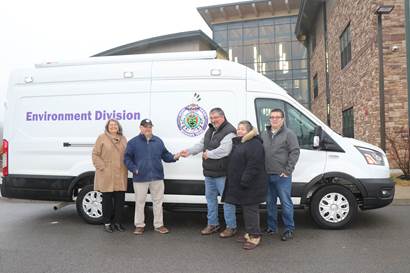
- Details
- By Native News Online Staff
On December 27th the Saint Regis Mohawk Tribe’s (SRMT) Environment Division’s Environmental Response Team (ERT) received a new custom-built 2023 Ford Transit response vehicle.
The new vehicle will replace the current US Air Force, 1982 International Harvester heavy-duty bus. The purchase (estimated cost of $172,000) was made possible through funds set aside by the Tribal Volkswagen Settlement Agreement.
 Make A Donation Here
Make A Donation Here
“This will truly elevate the professionalism and efficiencies of the SRMT Environment Response Team,” Tribal Chief Beverly Cook said.
The van will be utilized to transport vital supplies quickly and efficiently during emergency environmental situations. It comes loaded with plenty of storage space, a computer work area and an awning for protection from weather elements as well as other small amenities. Emergency lighting surrounds the vehicle, allowing to alert community members that an emergency situation is taking place and to avoid the area
where the vehicle is being used for the safety of themselves, as well as the ERT.
Storage cabinets line both sides of the bus to ensure safe keeping of all of the essential equipment needed by ERT. It’s modern style of white is embossed with the SRMT logo and large lettering that reads “Environment Division” on both sides of the bus.
“In the event of an emergency environmental response, the vehicle and it’s particular lighting should provide community members with a sense of calmness,” Tribal Chief Michael Conners said.
More Stories Like This
Gwich'in Tribal Governments Submit Comments Challenging Fish and Wildlife Service's Inadequate Environmental Review of Arctic Refuge Snow RoadRappahannock Tribe Challenges 9M-Gallon Water Plan
Feds release draft long-term plans for Colorado River management
Apache Leader Walks 60 Miles to Court Hearing That Will Decide Fate of Sacred Oak Flat
Rappahannock Tribe Raises Sovereignty and Environmental Concerns Over Caroline County Water Permit
Help us defend tribal sovereignty.
At Native News Online, our mission is rooted in telling the stories that strengthen sovereignty and uplift Indigenous voices — not just at year’s end, but every single day.
Because of your generosity last year, we were able to keep our reporters on the ground in tribal communities, at national gatherings and in the halls of Congress — covering the issues that matter most to Indian Country: sovereignty, culture, education, health and economic opportunity.
That support sustained us through a tough year in 2025. Now, as we look to the year ahead, we need your help right now to ensure warrior journalism remains strong — reporting that defends tribal sovereignty, amplifies Native truth, and holds power accountable.
 The stakes couldn't be higher. Your support keeps Native voices heard, Native stories told and Native sovereignty defended.
The stakes couldn't be higher. Your support keeps Native voices heard, Native stories told and Native sovereignty defended.
Stand with Warrior Journalism today.
Levi Rickert (Potawatomi), Editor & Publisher

